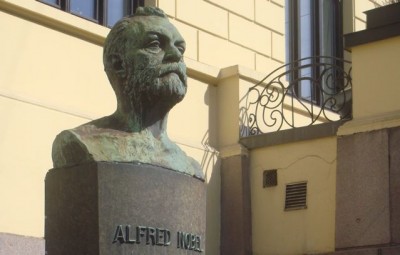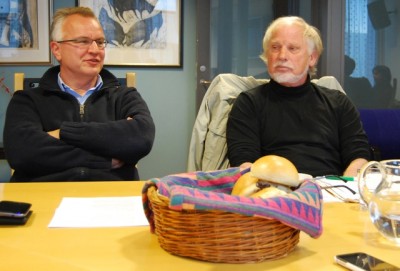The Norwegian Nobel Committee had 231 nominees this year for the Peace Prize created by Swedish industrialist Alfred Nobel, and they’ve sorted through another wide range of candidates to agree on the winner. No one is “perfect,” admits the committee’s secretary, as speculation swirled over the most likely candidates.

The Nobel Committee came under criticism earlier this week, when Norwegian Broadcasting (NRK) aired results of an investigation into how the committee screens its candidates, and questioned the worthiness of several winners. Committee secretary Geir Lundestad, who’s among those responsible for the screening, told newspaper Aftenposten on Thursday that no candidate is perfect.
If one had to be found, Lundestad said it probably would have been Nelson Mandela, who won the prize in 1993 for his struggle against apartheid. But even Mandela was involved in armed resistance, Lundestad noted.
Advocates of human rights and democracy in Russia figure highly among candidates tipped to win the prize this year. So do an American scholar on non-violent resistance, some key players in the Middle East and also in Latin America, which hasn’t produced a Peace Prize winner for 20 years. There’s even speculation that the now-reform-minded president of Myanmar (Burma), Thein Sein, will win the Nobel Peace Prize for his government’s release of political prisoners and moves towards democracy. A Peace Prize 21 years after Burmese opposition leader Aung San Suu Kyi won would reward Myanmar’s democracy efforts and, possibly, send a strong signal to non-democratic regimes.

In a meeting with foreign correspondents in Oslo this week, Norwegian historian and Nobel expert Asle Sveen aired his thoughts on who might win the prize, as did the head of Oslo peace research institute PRIO, Kristian Berg Harpviken.
Sveen’s favourite is a Mexican bishop, José Raul Vera López, who opposes the government’s war on drug dealers because “it’s only making things worse.” It’s also “a very long time” since anyone from Latin America won a Peace Prize, Sveen noted, not since Rigoberto Menchu in 1992. And López won the Norwegian Rafto Prize in 2010, giving him a “Norwegian connection” that Sveen thinks is important. Several Rafto winners have gone on to win the Peace Prize, including Aung San Suu Kyi, Kim Dae-jung of South Korea and Shirin Ebadi of Iran.
Russians high on the list
Sveen also mentions Cuban blogger and free speech activist Yoani Sanchez, but thinks the most likely candidates involve democracy and human rights advocates in Russia and/or Belarus, possibly both. One combination, he suggests, could be jailed dissident Ales Bialiatski of Belarus and Russian human rights campaigner Ludmila Alexeeva.
Belarus is often called “the last dictatorship in Europe” and it’s the only country in Europe that’s not a member of the Council of Europe, which Nobel Committee Chairman Thorbjørn Jagland also heads. Jagland would thus have no clear conflict of interest. Bialiatski likely wouldn’t be allowed to receive his prize, raising the prospect of another “empty chair” as in 2010, when jailed Chinese dissident Liu Xiaobo won. That prize set off a diplomatic freeze between China and Norway that still hasn’t thawed because Chinese leaders blame the Norwegian government for meddling in internal affairs, challenging China’s system of justice and for their own loss of face, even though the government has no influence on Nobel Committee decisions.
“But I don’t think (Russian President Vladimir) Putin would stop Ludmila Alexeeva (who is in her late 80s) from traveling to Oslo,” Sveen said. He says both Bialiatski and Alexeeva were nominated by politicians from both the Conservative and Labour parties in Norway, suggesting local bipartisan support for such a prize. Alexeeva has also been in Norway and long has had support from the Norwegian Helsinki Committee.
Other Russian candidates, also put forward by Harpviken of PRIO, are Russian activist Svetlana Gannushkina and the human rights organization “Memorial,” while Harpviken also suggests another Russian news organization, Echo, and its editor, Alexei Venediktov.
Both Sveen and Harpviken think a prize to a Russian dissident would be relevant given criticism of Russia’s backtracking on human rights, and they don’t think Russian leaders would react as angrily as the Chinese did, “even though Norway may have trouble selling salmon for awhile.” Asked whether Jagland would run into trouble because of his post at the Council of Europe, of which Russia is a member, Sveen said he didn’t think so. Jagland could excuse himself or take the heat.
‘Too many Americans’
Both men also mentioned US scholar Gene Sharp, who’s a favourite of the odds-makers for his influence in non-violent struggles. Sharp has also lived in Norway and speaks Norwegian, giving him a local connection, but Sveen thinks “there have been too many Americans” winning the prize lately. He thinks Sharp’s nationality would work against him.
Neither could see any clear candidates who could give hope to ending the violence in Syria, and they think it’s “too early” to offer any prizes for negotiating peace in Colombia. Talks begin in Oslo next week. On the humanitarian front, Sveen mentioned the international organization Save the Children, for its work in helping families and children around the world.
One other “long shot” according to Sveen, would be the European Union and/or, possibly, its most high-profile leader, German Chancellor Angela Merkel. She has worked tirelessly over the past several years to deal with the debt crises in several EU member countries and to save the euro as a common currency. Jagland himself has called the EU and its predecessor organizations “the most successful peace project ever” since it has prevented war among European neighbours since 1945.
A prize to the EU, possibly aimed at instilling some pride in the organization, may set off sparks at home in Norway, since it’s not a member of the EU and the vast majority of Norwegians remain opposed to joining. Norwegians don’t have a high opinion of the EU and likely would scoff at such a prize. It could help assert the Nobel Committee’s independence from the Norwegian government and Parliament, however, thereby sending yet another signal to China that it has erred in carrying a grudge against Norway for so long.
The Nobel Peace Prize for 2012 will be announced at 11am in Oslo.
Views and News from Norway/Nina Berglund
Please support our news service. Readers in Norway can use our donor account. Our international readers can click on our “Donate” button:

